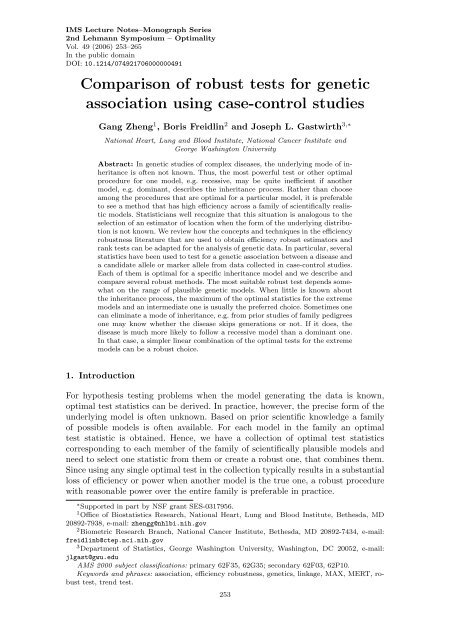Optimality
Optimality
Optimality
You also want an ePaper? Increase the reach of your titles
YUMPU automatically turns print PDFs into web optimized ePapers that Google loves.
IMS Lecture Notes–Monograph Series<br />
2nd Lehmann Symposium – <strong>Optimality</strong><br />
Vol. 49 (2006) 253–265<br />
In the public domain<br />
DOI: 10.1214/074921706000000491<br />
Comparison of robust tests for genetic<br />
association using case-control studies<br />
Gang Zheng 1 , Boris Freidlin 2 and Joseph L. Gastwirth 3,∗<br />
National Heart, Lung and Blood Institute, National Cancer Institute and<br />
George Washington University<br />
Abstract: In genetic studies of complex diseases, the underlying mode of inheritance<br />
is often not known. Thus, the most powerful test or other optimal<br />
procedure for one model, e.g. recessive, may be quite inefficient if another<br />
model, e.g. dominant, describes the inheritance process. Rather than choose<br />
among the procedures that are optimal for a particular model, it is preferable<br />
to see a method that has high efficiency across a family of scientifically realistic<br />
models. Statisticians well recognize that this situation is analogous to the<br />
selection of an estimator of location when the form of the underlying distribution<br />
is not known. We review how the concepts and techniques in the efficiency<br />
robustness literature that are used to obtain efficiency robust estimators and<br />
rank tests can be adapted for the analysis of genetic data. In particular, several<br />
statistics have been used to test for a genetic association between a disease and<br />
a candidate allele or marker allele from data collected in case-control studies.<br />
Each of them is optimal for a specific inheritance model and we describe and<br />
compare several robust methods. The most suitable robust test depends somewhat<br />
on the range of plausible genetic models. When little is known about<br />
the inheritance process, the maximum of the optimal statistics for the extreme<br />
models and an intermediate one is usually the preferred choice. Sometimes one<br />
can eliminate a mode of inheritance, e.g. from prior studies of family pedigrees<br />
one may know whether the disease skips generations or not. If it does, the<br />
disease is much more likely to follow a recessive model than a dominant one.<br />
In that case, a simpler linear combination of the optimal tests for the extreme<br />
models can be a robust choice.<br />
1. Introduction<br />
For hypothesis testing problems when the model generating the data is known,<br />
optimal test statistics can be derived. In practice, however, the precise form of the<br />
underlying model is often unknown. Based on prior scientific knowledge a family<br />
of possible models is often available. For each model in the family an optimal<br />
test statistic is obtained. Hence, we have a collection of optimal test statistics<br />
corresponding to each member of the family of scientifically plausible models and<br />
need to select one statistic from them or create a robust one, that combines them.<br />
Since using any single optimal test in the collection typically results in a substantial<br />
loss of efficiency or power when another model is the true one, a robust procedure<br />
with reasonable power over the entire family is preferable in practice.<br />
∗ Supported in part by NSF grant SES-0317956.<br />
1 Office of Biostatistics Research, National Heart, Lung and Blood Institute, Bethesda, MD<br />
20892-7938, e-mail: zhengg@nhlbi.nih.gov<br />
2 Biometric Research Branch, National Cancer Institute, Bethesda, MD 20892-7434, e-mail:<br />
freidlinb@ctep.nci.nih.gov<br />
3 Department of Statistics, George Washington University, Washington, DC 20052, e-mail:<br />
jlgast@gwu.edu<br />
AMS 2000 subject classifications: primary 62F35, 62G35; secondary 62F03, 62P10.<br />
Keywords and phrases: association, efficiency robustness, genetics, linkage, MAX, MERT, robust<br />
test, trend test.<br />
253
















